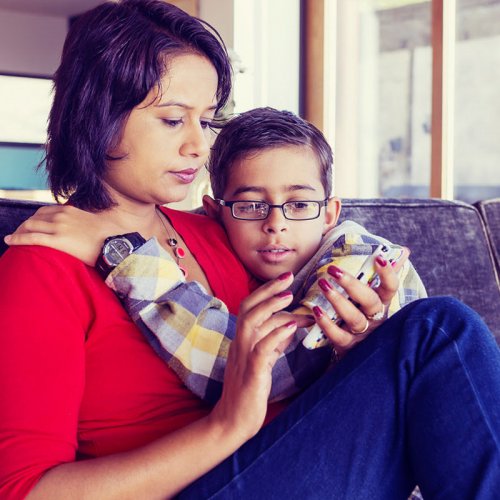Providing Answers, Support and Hope in North Carolina
Lupus and children
As a parent, there’s a lot you can do to help your child with lupus. Learning as much as you can about the disease is an important first step.
What is lupus?
Lupus is a chronic (long-term) disease that can cause inflammation (swelling) and pain in any part of the body. It’s an autoimmune disease, meaning that the immune system attacks healthy tissue (tissue is what organs are made of) and can cause organ damage.
Can children develop lupus?
People of all ages, genders, and racial and ethnic groups can develop lupus. But certain groups are at higher risk than others, including:
- Women ages 15 to 44
- People who are African American, Asian American, Hispanic/Latino, Native American, or Pacific Islander
- People who have a family member with lupus or another autoimmune disease
In the United States, at least 1.5 million people have lupus — and about 16,000 new cases of lupus are reported each year.
How does lupus affect children?
Lupus can affect children in different ways. For some, lupus can be mild — for others, it can be life-threatening.
In children, lupus most commonly affects the skin, joints, and major internal organs — like the kidneys, liver, brain, heart, or lungs. Lupus tends to be more aggressive and severe in children than in adults. People diagnosed in childhood also are more likely to have higher rates of organ damage than people diagnosed as adults.
What causes lupus?
No one knows what causes lupus, but experts think it develops in response to a combination of factors, including hormones, genetics, and environmental triggers. An environmental trigger is something outside of the body that can bring on lupus symptoms — or make them worse.
Some common triggers of lupus symptoms include:
- Ultraviolet (UV) rays from the sun or fluorescent lights
- Infections
- Exhaustion (feeling very tired)
- Physical or emotional stress
- Low vitamin D
- Cigarette smoke, including second-hand smoke
What are the symptoms of lupus?
Because lupus can affect many parts of the body, it can cause a lot of different symptoms. Keep in mind that these symptoms may come and go.
Symptoms of lupus may include:
- Fatigue (feeling tired often)
- Painful or swollen joints
- Swelling in the hands, feet, or around the eyes
- Headaches
- Low-grade fevers
- Sensitivity to sunlight or fluorescent light
- Chest pain when breathing deeply
Children with lupus may also have problems with the skin and hair, including:
- A butterfly-shaped rash on the cheeks and nose
- Hair loss
- Sores in the mouth or nose
Lupus may also cause problems with the blood and blood vessels, like:
- Blood clots
- Low numbers of red blood cells (anemia)
- Fingers and toes turning white or blue and feeling numb when a person is cold or stressed (Raynaud’s phenomenon)
What kinds of doctors treat lupus in children?
Most children who have lupus will see a pediatric rheumatologist. Pediatric rheumatologists specialize in diagnosing and treating children with autoimmune diseases, like lupus, and diseases in the joints, muscles, bones, and tendons. But because lupus can cause problems anywhere in the body, your child may have other types of doctors on their treatment team.
How is lupus treated?
While there’s no cure for lupus right now, having the right treatment plan can help:
- Control symptoms — like joint pain and inflammation
- Keep the immune system from attacking healthy tissue
- Protect the organs from damage
What medicines treat lupus?
Because lupus can cause a lot of different symptoms, there are many different kinds of medicines that can treat it. A doctor will need to prescribe some of these medicines — others are available over the counter. Some medicines are pills your child takes by mouth. Others are fluids that a health care professional puts directly into your child’s bloodstream using a needle or catheter (tube).
The most common medicines used to treat lupus include:
- Anti-inflammatories to help with inflammation and pain
- Antimalarials to protect skin from rashes and UV light
- Biologics to help the immune system work correctly
- Anticoagulants to help prevent blood clots
- Immunosuppressives to help keep the immune system from attacking the body
- Steroids to help with inflammation
Keep in mind that any medicine that your child takes for lupus can have side effects, and some medicines could put your child at risk for life-threatening infections. Talk with your child’s doctor about what changes to watch for with the medicines they’re taking. And tell your child’s treatment team right away if your child has any side effects.
How can I help my child learn how to manage (control) their symptoms?
It’s important to help your child avoid factors that trigger their symptoms or make them worse. Encourage your child to:
- Use sunscreen with SPF 30 or higher, and wear sun-protective clothing, like wide-brimmed hats, long sleeves, and pants
- Wash their hands often, and avoid people with colds or other contagious illnesses
- Ask for help when they need it
- Take a break when they’re feeling tired or stressed
- Tell an adult when they’re not feeling well
How can I help my child develop healthy habits?
Your child may need to make some changes to their daily routine to manage their lupus symptoms. Start by helping your child develop these healthy habits:
- Take all medicines as prescribed
- Attend all health care appointments and follow the doctor’s instructions
- Eat a healthy diet and be physically active
- Get enough sleep — aim for at least 9 hours each night
- Take breaks during the day to rest and recover
- Plan outdoor activities for early in the morning or later in the evening
What can I do to stay on top of my child’s health and keep track of everything?
There’s a lot you can do to stay on top of your child’s health. Use these tips to stay organized:
- Keep a journal to record your child’s symptoms, medicines, and side effects
- Organize your child’s health information in a care notebook or file
- Have a current copy of your child’s immunization record
- Use a calendar and reminders to keep track of your child’s appointments
- Keep all members of the treatment team informed of your child’s care
It’s also important to work with your child’s treatment team and check in often. Remember to:
- Tell the doctor right away if your child’s symptoms change or get worse
- Tell the doctor right away if your child has a fever over 100° F
- Make an appointment to have your child’s eyes checked every year
- Ask the doctor about screenings and dietary supplements for bone health
- Always check with the doctor before your child gets vaccines or allergy shots
- Always check with the doctor before giving your child any herbs, vitamins, or dietary supplements
This resource is available as a PDF in English, Spanish, and Chinese (simplified). Download now to print and share.


Our health educators are available to answer your questions and give you the help you need.




